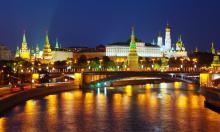Bush's trap for UN
The UN Security Council's open session-an unprecedented event for that body-may serve as the starting point not just for Iraq's post-Saddam era, but also for a new age in the history of the United Nations. It is unclear, however, whether the UN will remain an able-bodied organization or a handicapped one.
The event that proceeded for two days in the rundown building by the East River side resembled anything but a Security Council session. As is known, this 15-member Areopagus normally holds sessions behind closed doors to then promulgate its all-binding decisions to the global community. This latest session, at which officials from at least 70 countries took the floor to make their views heard, was more like an emergency session of the UN General Assembly or rather like a rally.
It was uniquely the UN Security Council that tended to Iraq from September 2002 through March 2003. No broad UN debates were held before the start of the military campaign against Iraq. And after the hostilities began, the Security Council, paralyzed by a schism between its members, made no attempt to qualify the action in legal terms, realizing only too well that this would not change anything.
The most recent Security Council session was prompted by the proposed resumption of the Food for Oil program. It was not about Iraq restarting its oil exports while at war, but about delivering 8.9 million worth of food and medications to pay for earlier petroleum supplies. This UN program used to provide the basic necessities for up to 60 percent of the Iraqi population and its suspension with the start of the war came as a real disaster for those people. The prospective supplies are expected to feed 13 million people for 45 days.
Opening the session, Kofi Annan made several interesting remarks to that score. It will be remembered that less than a week ago, the Secretary General said it would be physically impossible for the United Nations to deliver aid to a country under air attacks and that according to international law, as long as a war was underway, it was the invading side's responsibility to provide humanitarian supplies for the civilian population of the occupied country. But speaking at the Security Council session, Annan pointed out that the UN had failed to live up to the world's high expectations and that the only way for it to restore public confidence was by performing some specific tasks for Iraq, such as the reinstatement of the Food for Oil program or the raising of funds to alleviate the civilian Iraqis' plight.
This issue is a trap set for the UN by U.S. President George W. Bush. On the one hand, if the Security Council gets stuck in long deliberations on the wording of its new resolutions while more and more Iraqis die of starvation, its reputation will surely be affected. On the other hand, a majority of the member states believe the UN should not limit its participation in the Iraq settlement to humanitarian aid, tacitly approving the aggression against Iraq by the U.S. and its Coalition of the Willing, which are precisely the ones to blame for the present humanitarian crisis in Iraq. And if the UN degrades itself by becoming an assistant to the U.S. and Great Britain for humanitarian affairs, most of its members will turn away in disgust. It was the clash between these two positions that became the mainspring of the unusual Security Council session.
Washington wants the UN to attract material and financial aid from other nations, thereby reducing its [Washington's] own humanitarian expenses. But it strongly objects to the UN having a say on any post-Saddam arrangements.
Interestingly, the Americans failed to make British Prime Minister Tony Blair give up his idea of the UN's central role in the post-conflict reconstruction of Iraq. Blair proposed transferring all oil resources of the defeated Iraq to a UN-controlled trust fund. And he suggested that the UN adopt a new resolution on Iraq, one that would set forth, among other things, post-war administration principles. There were two main objectives behind Blair's proposals. One was to comply with the law, as all other options would just be unlawful. And the other was to talk Bush into making concessions for Europe as a way to prevent the trans-Atlantic rift from widening further. No concessions have yet been made, but, according to British media, Blair remains steadfast in his mediatory efforts, albeit somewhat low-key.
At the latest Security Council session, the United States and Britain made it clear that their goal was not to abolish the UN altogether, but just to turn it into a janitor responsible for cleaning up the trash left over from each war the two of them undertake. It has now become apparent what the U.S. needs allies for. Right before the war, Secretary of State Colin Powell claimed that some thirty nations rallied behind the U.S. The Americans did not need any military help, really, but other nations' support made them look better in the eyes of the global community. At the Security Council's latest session, that support came in very handy indeed. Addressing the gathering, the Polish ambassador said the failure to make steps to rid Saddam Hussein of weapons of mass destruction would only undermine the UN's authority further. Representatives of other U.S.-friendly states echoed the point, urging the United Nations to immediately take care of the humanitarian disaster in Iraq. Representatives of such neutral countries as Iceland and Mongolia sounded as if this disaster had been caused by some natural forces rather than by a violation of international law. The call for Saddam to disarm proved to be a lifeline for these UN members.
Besides Secretary General Annan, the Security Council session was also initiated by the Arab League and the Non-Aligned Movement. Membership in these two organizations overlaps, but the member countries constitute two-thirds of the UN, and all of them are burning with anger. They are outraged at the Security Council's failure to pressure the U.S. and Britain into a cease-fire in Iraq and, hence, to live up to its Charter-consolidated obligations to maintain world peace and security.
Representatives of the Arab League member states reminded of their March 23 resolution, calling for the Security Council to demand an urgent cease-fire in Iraq and the withdrawal of Coalition troops from that country.
The Greek Ambassador to the UN echoed his Arab counterparts, saying that the European Union deemed it necessary that the United Nations played a pivotal role in the Iraqi crisis and that it wanted the Security Council to provide the UN with an appropriate mandate. By the way, shortly after the invasion of Iraq by the Coalition forces, EU officials at various levels re-affirmed that no money for Iraqi reconstruction was forthcoming from Europe unless the Security Council adopted an appropriate resolution. Most of the speeches at the open session went along these lines.
The essence of what was really happening was expressed on Day One of the session by the South African Ambassador. He cautioned the Security Council against the adoption of a resolution that would legitimize the military action against Iraq. Incidentally, the Iraqi Ambassador, who took the floor twice, did not ask the UN for any humanitarian aid, but he did ask it for a resolution that would stop the military action in his country.
It is still too early to conclude that Bush's trap has failed to work. Too many countries stated that Iraq's humanitarian crisis urged members of the international community to forget about their differences and join hands in helping the Iraqi people. Draft resolutions reinstating the Oil for Food program will be put to a vote Friday. One of the drafts has been advanced by Germany; other countries may follow suit and submit versions of their own. Reportedly, the Security Council members have already reached an agreement on making the resolution's wording as much depoliticized as possible.
Things seem more or less clear with the UN's humanitarian role. But the organization's future image remains obscure. Anyway, if our world has not been multi-polar until now, it has eventually become that way.
It became evident at the session that the Security Council members had not really changed their attitudes to the war in Iraq. Four of them-the United States, the United Kingdom, Spain and Bulgaria-remain staunch supporters of the use of military force against Saddam. The other eleven members vehemently oppose that option or at least question its legitimacy.
Before the war in Iraq, the Coalition enjoyed support of only a handful of states. As the military action was launched, the number of supporters reached thirty, according to Secretary of State Powell. For most of those backing the current military operation in Iraq, siding with the Americans was a last-minute decision, motivated primarily by the desire for material gain.
The Coalition of the Willing is a very weird alliance indeed, bringing together countries as far apart as Albania and Palau, Japan and Poland. They seem to have nothing in common but the opportunistic instinct to carry the train of HM Bush's robe. A large group of states would rather be keeping a low profile now. To all of them, the UN must be dead already.
Equally weird is the motley Opposition camp, grouping "old Europe," Russia, India, China, and Third World countries. But these seem to still believe in the UN and to still need it.
Are we now going to live in a bipolar world, split by the antagonism between those two weird blocs, a world in which the United Nations will represent only a part [even if a greater part] of the world community rather than the whole of it? Will that organization move its headquarters to Vienna or Paris now?
Or are we just facing chaos, in which a nuclear arsenal is the only way to ensure one's relative security? If that is the case, we will see the emergence of more nuclear powers soon. Maybe even sooner than the war in Iraq ends.
Subscribe to Pravda.Ru Telegram channel, Facebook, RSS!




